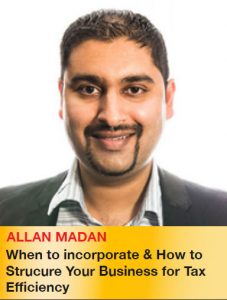When to Incorporate: Structuring Your Business for Taxes
Allan Madan, CPA, CA


Although real estate can provide many lucrative opportunities for investors, the practice is often accompanied by a host of tax-related challenges. In fact, investors who don’t adequately
prepare for tax season may find themselves in dire financial straits.“If you go about it the wrong way, such as structuring your business incorrectly, you could end up paying a lot more in taxes than you anticipated says” Allan Madan. “Other bad consequences
include failure to protect your assets, exposing yourself to liability and the pitfalls you can face when selling your property if it’s not set up properly.”Madan, a chartered accountant who spent seven years as an international tax manager with Deloitte, hopes to advise investors on real estate taxes, sharing strategies that can help protect their wealth and investment portfolios.
At the Investor Forum, he’ll explain such nuanced topics as:
- Comparing tax rates of owning property as a Canadian corporation, as
opposed to individually or with a joint partner - Write-offs that can be claimed corporately and privately
- The three-tier structure and its advantages
- The differences in passive and active income
- The concept of a refundable dividend tax
- Income-splitting opportunities that are beneficial to individuals and family
trust planning
He also plans to discuss trust options for investors, a hot topic on many property
owners’ minds.
“I want to delve into why you need a bare trust” he says. “ For financing purposes, if a corporation doesn’t have a corporate history and can’t get a mortgage, I introduce the concept of bare trust, which can help facilitate financing.”
While these topics are complex, Madan will explain them in a way that allows investors to employ financial best practices in their daily real estate endeavors.“I plan to provide easy-to-follow tips that they can implement,” he says. “Typically they end up seeing great results.”
Another topic Madan is particularly excited to explore is the different tax implications between dix-and-flip and buy-and-hold strategies. He says many investors are curious about the tax consequences of flipping, and he plans to educate them on the differences between the two. He also will discuss the most effective way to organize records so that the unexpected audits don’t leave property owners with an exorbitant tax bill.
“This information is critical for new investors buying their first property, as well as seasoned ones who want to enhance their profitability and minimize tax liabilities,” Madan says.
“There’s something for everyone”.
Disclaimer
The information provided on this page is intended to provide general information. The information does not take into account your personal situation and is not intended to be used without consultation from accounting and financial professionals. Allan Madan and Madan Chartered Accountant will not be held liable for any problems that arise from the usage of the information provided on this page.



